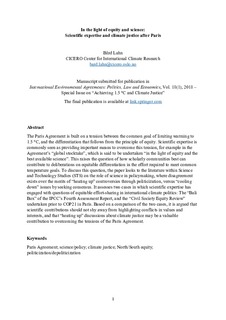In the light of equity and science: scientific expertise and climate justice after Paris
Peer reviewed, Journal article
Accepted version
Permanent lenke
http://hdl.handle.net/11250/2491403Utgivelsesdato
2017Metadata
Vis full innførselSamlinger
- Journal articles [478]
Originalversjon
International Environmental Agreements: Politics, Law and Economics. 2017, 18 (1), 29-43. 10.1007/s10784-017-9375-8Sammendrag
The Paris Agreement is built on a tension between the common goal of limiting warming to 1.5 °C, and the differentiation that follows from the principle of equity. Scientific expertise is commonly seen as providing important means to overcome this tension, for example in the Agreement’s “global stocktake”, which is said to be undertaken “in the light of equity and the best available science”. This raises the question of how scholarly communities best can contribute to deliberations on equitable differentiation in the effort required to meet common temperature goals. To discuss this question, the paper looks to the literature within Science and Technology Studies (STS) on the role of science in policymaking, where disagreement exists over the merits of “heating up” controversies through politicization, versus “cooling down” issues by seeking consensus. It assesses two cases in which scientific expertise has engaged with questions of equitable effort-sharing in international climate politics: The “Bali Box” of the IPCC’s Fourth Assessment Report, and the “Civil Society Equity Review” undertaken prior to COP21 in Paris. Based on a comparison of the two cases, it is argued that scientific contributions should not shy away from highlighting conflicts in values and interests, and that “heating up” discussions about climate justice may be a valuable contribution to overcoming the tensions of the Paris Agreement.
